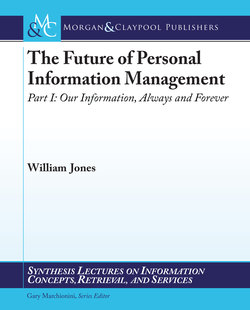Читать книгу The Future of Personal Information Management, Part 1 - William Jones - Страница 6
ОглавлениеABSTRACT
We are well into a second age of digital information. Our information is moving from the desktop to the laptop to the “palmtop” and up into an amorphous cloud on the Web. How can one manage both the challenges and opportunities of this new world of digital information? What does the future hold? This book provides an important update on the rapidly expanding field of personal information management (PIM).
Part I (Always and Forever) introduces the essentials of PIM. Information is personal for many reasons. It’s the information on our hard drives we couldn’t bear to lose. It’s the information about us that we don’t want to share. It’s the distracting information demanding our attention even as we try to do something else. It’s the information we don’t know about but need to. Through PIM, we control personal information. We integrate information into our lives in useful ways. We make it “ours.” With basics established, Part I proceeds to explore a critical interplay between personal information “always” at hand through mobile devices and “forever” on the Web. How does information stay “ours” in such a world?
Part II (Building Places of Our Own for Digital Information) will be available in the Summer of 2012, and will consist of the following chapters.
• Chapter 5. Technologies to eliminate PIM? We have seen astonishing advances in the technologies of information management—in particular, to aid in the storing, structuring and searching of information. These technologies will certainly change the way we do PIM; will they eliminate the need for PIM altogether?
• Chapter 6. GIM and the social fabric of PIM. We don’t (and shouldn’t) manage our information in isolation. Group information management (GIM)—especially the kind practiced more informally in households and smaller project teams—goes hand in glove with good PIM.
• Chapter 7. PIM by design. Methodologies, principles, questions and considerations as we seek to understand PIM better and to build PIM into our tools, techniques and training.
• Chapter 8. To each of us, our own. Just as we must each be a student of our own practice of PIM, we must also be a designer of this practice. This concluding chapter looks at tips, traps and tradeoffs as we work to build a practice of PIM and “places” of our own for personal information.
KEYWORDS
PIM, personal information management, information overload, HCI, human-computer interaction, cognitive science, keeping found things found
